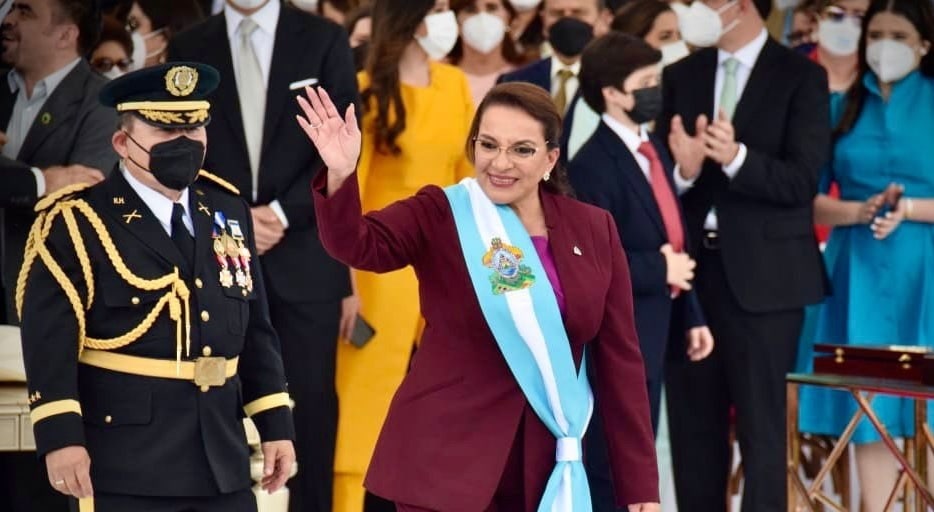US-Backed Coup Regimes Trapped Honduras in Unpayable Odious Debt, Warns new President Xiomara Castro


Orinoco Tribune – News and opinion pieces about Venezuela and beyond
From Venezuela and made by Venezuelan Chavistas

By Bejamin Norton – Feb 1, 2022
At the time of the 2009 US-backed coup, Honduras had $2.48 billion in external debt. Now it has $9.25 billion. New leftist President Xiomara Castro says this odious debt is unpayable. It already eats up 50% of the government budget.
The new leftist administration in Honduras managed to win November 2021 elections in a landslide and defeat an authoritarian coup regime, but now it faces a huge problem that will make it difficult to govern: odious debt.
When a US-sponsored military coup overthrew Honduras’ democratically elected left-wing President Manuel Zelaya in 2009, the country had $2.48 billion in external debt.
By the end of 2021, after 12 years of rule by corrupt right-wing coup regimes, Honduras’ external debt had swelled to $9.25 billion – a 373% increase.
The Honduran state’s internal debt to private parties likewise skyrocketed from approximately $810 million in 2009 to roughly $7.3 billion today.
Honduras’ GDP is only $23.8 billion, yet the country is saddled with more than $16.5 billion in debt – meaning its debt is nearly 70% of the size of its entire economy.
RELATED CONTENT: 2021 Latin America and the Caribbean in Review: The Pink Tide Rises Again
The Central American nation’s new leftist President Xiomara Castro, Honduras’ first democratic leader since the coup, has said this burden on the government is a form of odious debt, and is simply unpayable.
Castro declared in a speech at her inauguration on January 27 that the previous coup regimes had “submerged” the state in debt, leaving it in “bankruptcy” in an “economic catastrophe.”
Debt payments now eat up a staggering 50% of the government’s budget, Castro stressed.
This graph from Honduran media outlet La Prensa shows how the debt skyrocketed after the US-backed coup.

This graph does not include Honduras’ massive internal debt.
“After 12 years of dictatorship the amount of internal debt increased from 20 billion lempiras (USD $810 million) to 179 billion lempiras (USD $7.3 billion),” Castro said in her inauguration speech.
“With these figures it is clear that the state does not have the capacity to sustain the outrageous and shameful debt that we are inheriting,” the new Honduran president added. “It is practically impossible to meet the debt requirements.”
Castro said the only way to manage the debt is to renegotiate it with the creditors.
“My government will not continue the vortex of plunder that has condemned generations of youth to pay the debt they took on behind their backs,” she declared.
“The country should know what they did with the money and where are the $20 billion that they took out in loans.”
The new Honduran president warned that this “plunder” caused poverty to increase by 74%, “turning us into the poorest country in Latin America.”
“This statistic itself explains the [migrant] caravan of thousands of people looking for opportunities,” she said.
RELATED CONTENT: Honduras: Back After 12 Years
Debt traps ensnare Argentina, Puerto Rico, Greece
Other countries in Latin America have been caught in these same kinds of debt traps.
In 2018, Argentina’s right-wing President Mauricio Macri took the largest loan in the history of the International Monetary Fund (IMF): $57.1 billion.
This enormous debt incurred by Macri pushed the subsequent center-left government of President Alberto Fernández into a debt spiral that has made it very difficult to spend on social programs.
The IMF, which is dominated by the United States, and is used as an economic weapon to advance Washington’s foreign-policy agenda, has often trapped Global South nations in unpayable debt.
The IMF uses this debt as leverage to force countries to sell off their natural resources, privatize state-owned enterprises, slash social spending, and cut labor protections that challenge the interests of foreign corporations.
Puerto Rico, a US colony, also suffers from painful odious debt. The US government used this debt burden to impose an unelected Financial Oversight and Management Board that controls Puerto Rico’s spending, and has imposed devastating austerity measures on the Puerto Rican people.
Even Greece, a member of the European Union, has similarly been crushed under the weight of odious debt. While Greeks work the most hours in Europe, economics experts have said the country’s debt is impossible to pay off.
Featured image: President Xiomara Castro

Benjamin Norton is the founder and editor of the independent news website Multipolarista, where he does original reporting in both English and Spanish. Benjamin has reported from numerous countries, including Venezuela, Nicaragua, Bolivia, Ecuador, Honduras, Colombia, and more. His journalistic work has been published in dozens of media outlets, and he has done interviews on Sky News, Al Jazeera, Democracy Now, El Financiero Bloomberg, Al Mayadeen teleSUR, RT, TRT World, CGTN, Press TV, HispanTV, Sin Censura, and various TV channels in Mexico, Nicaragua, Venezuela, Ecuador, and Bolivia. Benjamin writes a regular column for Al Mayadeen (in English and Spanish). He was formerly a reporter with the investigative journalism website The Grayzone, and previously produced the political podcast and video show Moderate Rebels. His personal website is BenNorton.com, and he tweets at @BenjaminNorton.